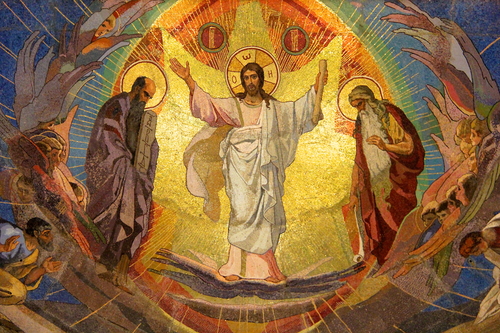Did 1948 Begin the Last Generation? – LIVE Q&A for February 4, 2021
/0 Comments/in Q&A Podcast/by David GuzikAre Christians Losing Their Freedom? – Q&A for January 28, 2021
/0 Comments/in Q&A Transcripts/by David GuzikEnjoy the Feast, Tell the News – 2 Kings 7:9 – February 15 2021
/0 Comments/in Enduring Words for Troubled Times/by David GuzikTimes of Refreshing
/0 Comments/in Weekly Devotional/by David GuzikRepent therefore and be converted, that your sins may be blotted out, so that times of refreshing may come from the presence of the Lord, and that He may send Jesus Christ, who was preached to you before (Acts 3:19-20)
As he did in his first sermon (Acts 2:38), Peter called upon his hearers to repent. He told them to turn aroundin their thinking and actions. In the previous verses Peter spoke directly to them about their sin, but he didn’t just want to make them feel bad. That wasn’t his goal. The goal was to encourage them to repent and believe.

It’s good to remember that repentance does not describe being sorry, but describes the act of turning around. And as he used it before in Acts 2, here also Peter made repent a word of hope. He told them that they had done wrong; but that they could turn it around and become right with God.
It wasn’t only a call to repent, but also to be converted: Peter knew the necessity of conversion, of God’s work of bringing new life to us. Being a Christian is not “turning over a new leaf,” it is being a new creation in Christ Jesus (2 Corinthians 5:17).
One writer says that be converted is better translated, “turn to God” – or, even better, “flee to God.” This connects with the image of the cities of refuge in the Old Testament – we run to Jesus as our place of refuge.
Peter went on to describe two benefits of repentance and conversion. First, that your sins may be blotted out: This was the first benefit of repentance Peter presented to them. The one who repents and is converted is forgiven their sins, and the record itself is erased.
Those sins are blotted out. This has the idea of wiping ink off of a document. Ink in the ancient world had no acid content and didn’t “bite” into the paper. It could almost always be wiped off with a damp cloth. Peter said that God would wipe away our record of sin just like that.
The second benefit of repenting and turning to God was so that times of refreshing may come from the presence of the Lord. In speaking of “times of refreshing,” Peter referred to the time when Jesus will return and rule in righteousness. The ultimate times of refreshing will be fulfilled when Jesus Christ returns in glory. In a lesser (though glorious) sense, God sends times of refreshing to His people today. We should pray for and believe God for seasons of revival and refreshing.
Every sensible person wants their sins to be blotted out. Every weary person wants God to send times of refreshing that may come from the presence of the Lord. If you have repented and been converted, ask God for the true experiential possession of these, in confidence that this is your birthright as one of God’s children. You can talk to God about this today.
In Jesu Namen
/0 Comments/in Wöchentliche Andacht/by David GuzikUnd auf den Glauben an seinen Namen hin hat sein Name diesen hier stark gemacht, den ihr seht und kennt; ja, der durch Ihn [gewirkte] Glaube hat ihm diese volle Gesundheit gegeben vor euch allen. (Apostelgeschichte 3,16)
Als Petrus der aufgeregten Menge predigte, merkte er, dass er ihnen erklären musste, wie der Mann tatsächlich geheilt wurde. Schließlich handelte es sich um einen stadtbekannten Bettler. Wir wissen nicht, ob man ihn mochte, doch nach den vielen Jahren, die er dort im Hof des Tempels gesessen hatte, war er gut bekannt. Als der, der nicht gehen konnte, nun aufsprang und umherlief (Apostelgeschichte 3,8), verlangte das nach einer Erklärung.

Petrus sagte ihnen, wie der Mann geheilt wurde – im Namen Jesu: Und auf den Glauben an seinen Namen hin hat sein Name diesen hier stark gemacht. Petrus sagte, dass der Mann im Namen Jesu gesund wurde. Jesus war der Grund dafür, dass er wieder laufen, springen und Gott loben konnte.
Auf den Glauben an seinen Namen bedeutet mehr als wenn Petrus die Worte „in Jesu Namen“ sprach. Viele Menschen haben die Gewohnheit ihr Gebet mit diesen Worten „in Jesu Namen“ zu beenden. Das basiert auf der Verheißung, die Jesus in Johannes 14,13-14 machte: Und alles, was ihr bitten werdet in meinem Namen, das will ich tun, damit der Vater verherrlicht wird in dem Sohn. Wenn ihr etwas bitten werdet in meinem Namen, so werde ich es tun.
Doch etwas „in Jesu Namen“ zu tun, bedeutet weit mehr als diese Worte am Ende eines Gebets zu sprechen. Für Petrus bedeutete es, dass er das ganz bewusst (Apostelgeschichte 3,1-7) in der Autorität und Macht Jesu tat, und nicht in seiner eigenen. Petrus sagte noch nicht einmal, dass es sein Glaube war, der die Heilung herbeigeführt hatte (ja, der durch Ihn [gewirkte] Glaube hat ihm diese volle Gesundheit gegeben vor euch allen).
Biblisch gesehen ist ein Name nicht nur das, wie man jemanden nennt. Der Name kann die Natur oder den Charakter einer Person ausdrücken.
Petrus bestand darauf, dass dieses erstaunliche Wunder durch den Glauben an seinen Namen geschah. Das sollte uns ein Beispiel für unser Leben mit Gott sein. Wenn wir, als Gottes Kinder, in der Welt Gutes tun, sollten wir das durch den Glauben an seinen Namen tun. Wir sind immer versucht, in Etwas oder Jemanden zu vertrauen, wenn wir handeln.
- oft vertrauen wir auf gute Absichten
- oft vertrauen wir auf Talente und Gaben
- oft vertrauen wir auf materielle Quellen
- oft vertrauen wir auf einen guten Ruf und frühere Erfolge
- oft vertrauen wir auf harte oder gute Arbeit
Doch wir müssen stattdessen immer auf den Glauben an seinen Namen vertrauen und darin handeln.
Triff heute eine Entscheidung: lebe und tue Gutes in Jesu Namen, nicht in deinem.
En el nombre de Jesús
/0 Comments/in Devocional Semanal/by David GuzikY por la fe en su nombre, a éste, que vosotros veis y conocéis, le ha confirmado su nombre; y la fe que es por él ha dado a éste esta completa sanidad en presencia de todos vosotros. (Hechos 3:16)
Mientras Pedro predicaba a la multitud emocionada, sintió que tenía que explicarles cómo fue realmentesanado el hombre. Después de todo, este era un hombre que probablemente era un mendigo muy conocido en los patios del templo. No sabemos si era del agrado de todos, pero después de mendigar en el mismo lugar durante muchos años, probablemente era muy conocido. Cuando alguien que no podía caminar, ahora caminaba, saltaba y alababa a Dios (Hechos 3: 8), esto demandaba una explicación.

Pedro les dijo cómo fue sanado el hombre – en el nombre de Jesús: Y por la fe en su nombre, a éste, que vosotros veis y conocéis, le ha confirmado su nombre. Pedro dijo que fue en el nombre de Jesús que este hombre fue sanado. Jesús era la razón por la que podía caminar, saltar y alabar a Dios.
Decir, por la fe en su nombre significa más que el que Pedro haya dicho las palabras “en el nombre de Jesús”. Mucha gente tiene la costumbre de terminar su oración con las palabras “en el nombre de Jesús”. Esto se basa en la promesa que Jesús hizo registrada en Juan14:13-14:Y todo lo que pidiereis al Padre en mi nombre, lo haré, para que el Padre sea glorificado en el Hijo.Si algo pidiereis en mi nombre, yo lo haré.
Pero hacer algo “en el nombre de Jesús” significa mucho más que solo decir esas palabras al final de nuestra oración. Para Pedro, significaba que lo había hecho conscientemente (Hechos 3: 1-7) con la autoridad y el poder de Jesús, no con la autoridad y el poder de Pedro. De hecho, Pedro ni siquiera se atribuiría el mérito de la fe que se ejerció en la sanación (y la fe que es por él ha dado a éste esta completa sanidad en presencia de todos vosotros).
En el pensamiento bíblico, un nombre no solo es algo que llamas a alguien. El nombre puede expresar la naturaleza o el carácter de una persona. En cierto sentido, el poder de una persona está presente en su nombre y su carácter está disponible en el nombre de la persona.
Pedro insistió en que este milagro fue hecho por la fe en su nombre. Este debería ser un modelo para nosotros en nuestra vida para Dios. Cuando nosotros, como pueblo de Dios, realmente hacemos el bien en este mundo, debemos hacerlo por la fe en su nombre. Siempre estamos tentados a hacer las cosas confiando en algo o en alguien más.
– A menudo confiamos en las buenas intenciones.
– A menudo confiamos en talentos y dones.
– A menudo confiamos en los recursos materiales.
– A menudo confiamos en la reputación y el éxito anterior.
– A menudo confiamos en el trabajo duro o en el trabajo inteligente.
En cambio, siempre debemos confiar y hacer el bien por la fe en su nombre.
Hoy, haga usted una elección: vivir y hacer el bien en el nombre de Jesús, no en el suyo propio.
Haz clic aquí para el comentario de David de Hechos 3




